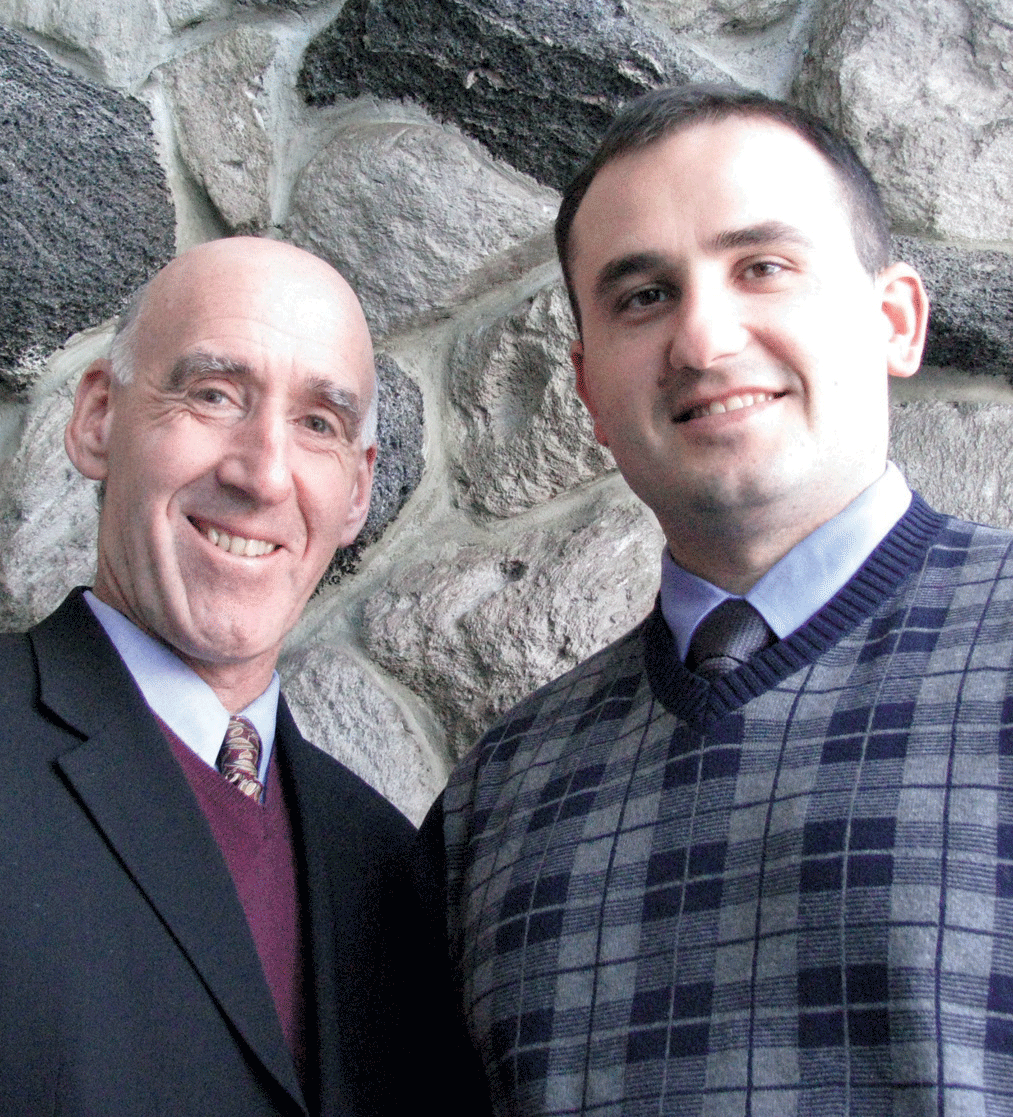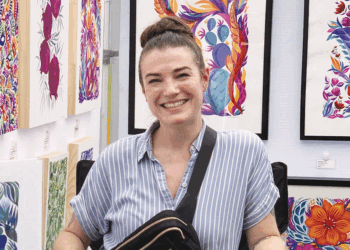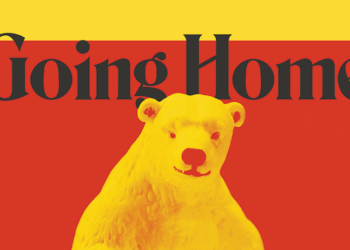Bulgarian Jewry, which was saved in the Shoah then repressed during the Communist era, is enjoying a resurgence
By MORDECAI SPECKTOR
Dr. Alexander (“Alek”) Oscar, a neuro-ophthalmologist and president of the Sofia, Bulgaria, Jewish community, recently visited the AJW offices. Accompanied by Mort Naiman, campaign coordinator for the Minneapolis Jewish Federation, Oscar came to express his appreciation for the support from Jews in Minnesota for the Jewish communities of Eastern Europe and “to share with you our incredible story of rebuilding Jewish life in Eastern Europe.”
Oscar, 31, who is also vice president of the Bulgarian Jewish community (first elected at the age of 25), said that the significance of current efforts to encourage Jewish life in his homeland might not be fully appreciated for “50 years, 100 years from now, the next several generations will really start to understand the impact of everything that has been going on.”
 Mort Naiman (left) and Dr. Alexander Oscar. (Photo: Mordecai Specktor)
Mort Naiman (left) and Dr. Alexander Oscar. (Photo: Mordecai Specktor)
The Jewish community in Bulgaria is an ancient one, tracing its roots back to the Roman period. Until the immigration of Jewish refugees from Spain in the late 15th century, Bulgarian Jews followed the Romaniot (Byzantine) prayer ritual, according to Jewish Communities of the World, edited by Dr. Avi Beker. As other Jews from Europe found refuge in Bulgaria, the Sephardic community established its unique identity.
Another aspect of the Bulgarian Jewish community’s development occurred during the Holocaust, when various elements of society organized to save the nation’s 50,000 Jews from deportation to death camps. Following World War II, about 90 percent of Bulgarian Jews emigrated to Israel. Oscar mentioned that there is a large and esteemed Bulgarian community in Israel, centered in Tel Aviv.
As in many Soviet satellite lands, Bulgaria languished during the postwar years. The dictator Todor Zhivkov closed the borders — and banned the work of the American Jewish Joint Distribution Committee (JDC), the international relief arm of the North American Jewish community. Bulgarian Jewry was adrift and disconnected from the world Jewish community, until the fall of Communism, which Oscar dates as Nov. 10, 1989.
Unlike the violent revolution in Romania, Bulgaria experienced a nonviolent transition to democracy. And, in 1990, JDC returned to Bulgaria to aid the country’s Jews.
“It was the very right moment, because these were first very difficult years of the post-Communist period in Bulgaria and Eastern Europe,” Oscar explained. “These were the so-called ‘hungry years’ — people were starving and dying on the streets, including Jewish families.”
JDC representatives arrived with food boxes for the local Jewish community.
“It was my first serious clash with another world,” Oscar recalled. “I was surprised and astonished why people we have never met are sending food and helping people they have never met. And later on I understood this is the most fundamental part of the feeling of tzedaka — helping people in need, doesn’t matter where they are, doesn’t matter if you know them or you don’t know them.”
Through the financial and consulting efforts of the JDC, the Bulgarian Jews were able to reestablish their community. Oscar said that with the JDC’s expertise about 90 percent of Jewish properties in Bulgaria that were confiscated during the Holocaust have been returned to the community.
Bulgarian Jewry is “a constantly evolving community,” which has gone from attending to the needs of the elderly, to establishing a structure for informal Jewish education, summer camps, a Jewish school, and other opportunities for young Jews.
“Today we have a community life that is vibrant and really almost self-sustaining,” Oscar commented. “We have a lot of young people who are motivated, who are ready to take the responsibility to lead the community into the future.”
Regarding relations between the Jewish community and the Bulgarian government today, Oscar cited the example of the Sofia Synagogue, the largest synagogue in southeastern Europe, which celebrated its 100th anniversary on Sept. 9, 2009. The government appropriated $600,000 as part of the synagogue restoration.
On a personal note, Oscar said that his introduction to Judaism came with his grandmother’s death in May 1991, when he encountered Jewish rituals surrounding death and mourning. On the happier side, he met the woman he would later marry while attending Gesher, a Jewish gathering in Thessalonika, Greece. They were both Jews from Sofia, but had never met; they married in 2006.
And illustrating the fact that Bulgaria does not have the world’s strongest economy, Oscar allowed that as a medical specialist (with a doctorate) working at the University Clinic of Neurology in Sofia, he earns between $450 and $500 per month. He supplements that income by working as a consultant to nongovernmental organizations.
Oscar said that he visits Israel at least once a year. Likewise, young Bulgarian Jews also participate in study programs in the Jewish state. And he mentioned that non-Jewish Bulgarians are going to Israel as tourists in increasing numbers.
(American Jewish World, 2.19.10)
Â










 Mort Naiman (left) and Dr. Alexander Oscar. (Photo: Mordecai Specktor)
Mort Naiman (left) and Dr. Alexander Oscar. (Photo: Mordecai Specktor)









Thank you for the lovely story about the Bulgarian Jewish Community. When I studied in ulpan 15 years ago in Jerusalem, one of my first friends was from Sofia, and we have continued to be close companions all of these years. The story of the Bulgarian Jews must be told in greater detail so that we may appreciate what these lovely people have endured.
Bettina Gould
Minneapolis to Jerusalem 1994
Thank you for the lovely story about the Bulgarian Jewish Community. When I studied in ulpan 15 years ago in Jerusalem, one of my first friends was from Sofia, and we have continued to be close companions all of these years. The story of the Bulgarian Jews must be told in greater detail so that we may appreciate what these lovely people have endured.
Bettina Gould
Minneapolis to Jerusalem 1994
Thank you for the lovely story about the Bulgarian Jewish Community. When I studied in ulpan 15 years ago in Jerusalem, one of my first friends was from Sofia, and we have continued to be close companions all of these years. The story of the Bulgarian Jews must be told in greater detail so that we may appreciate what these lovely people have endured.
Bettina Gould
Minneapolis to Jerusalem 1994
Thank you for the lovely story about the Bulgarian Jewish Community. When I studied in ulpan 15 years ago in Jerusalem, one of my first friends was from Sofia, and we have continued to be close companions all of these years. The story of the Bulgarian Jews must be told in greater detail so that we may appreciate what these lovely people have endured.
Bettina Gould
Minneapolis to Jerusalem 1994
Found this terrific article above. It has definitely hit “home”. My husband is Isaac Hananel. His uncle was the chief Rabbi of Sophia, Chief Rabbi ,Asher Hananel Z”L, before and during WWII. I would like to make contact with Dr. Alexander Oscar and perhaps plan a trip back to Sophia. Is there a way to contact him by e-mail?
Thank you for your help and thank you for the article.
Carol Hananel
Dear Carol Hananel,
I am working on a film regarding the saving of the Bulgarian Jews and need a photo of your uncle Rabbi Asher Hananel.
You can contact me by email: yivka@yahoo.com
or Tel: 818-905-6529 in Los Angeles, CA
Many thanks.
Ivan